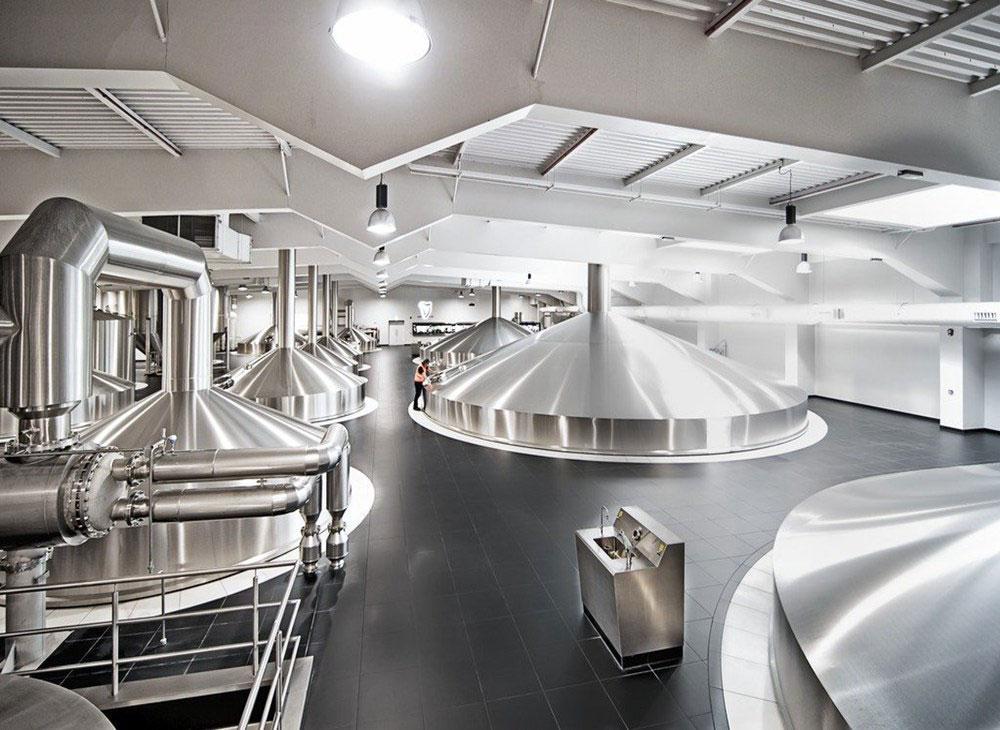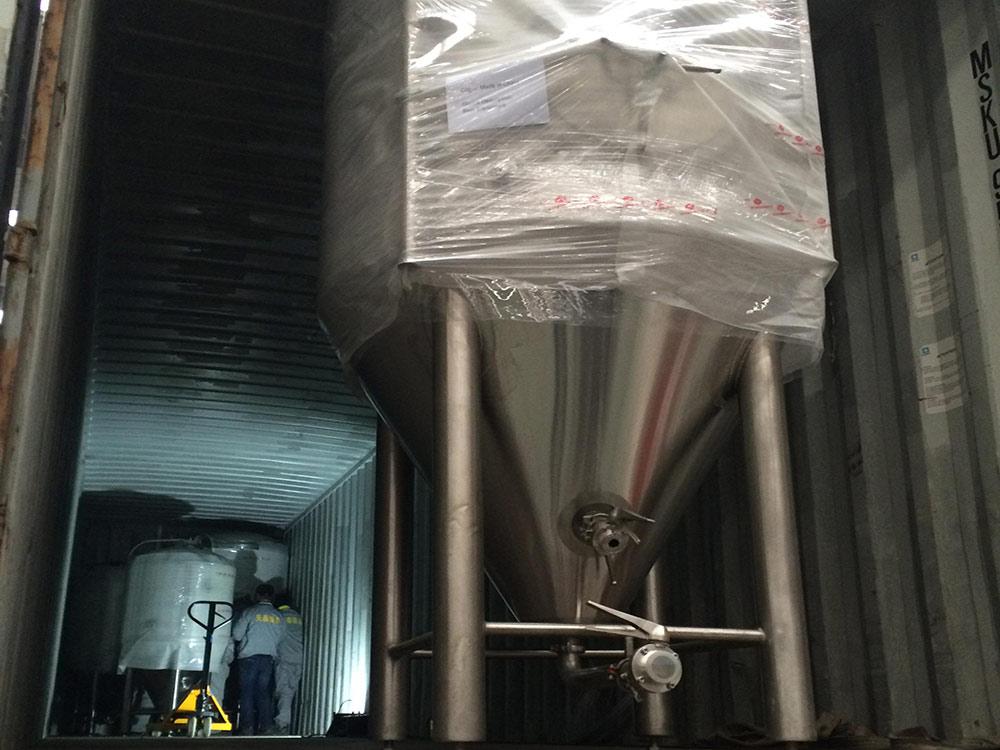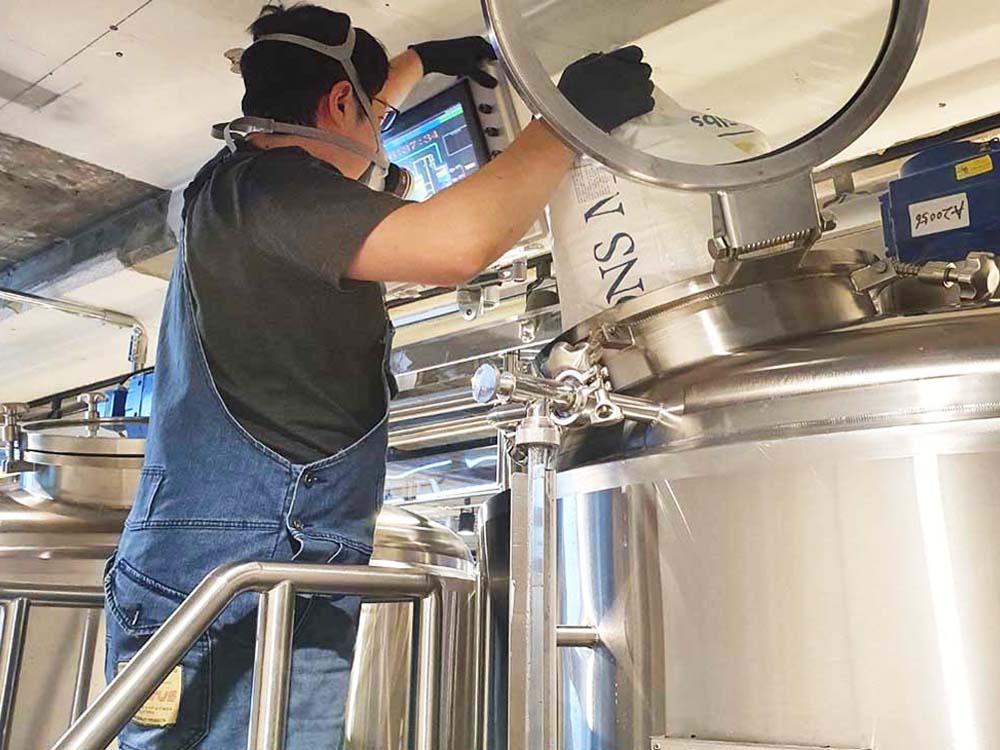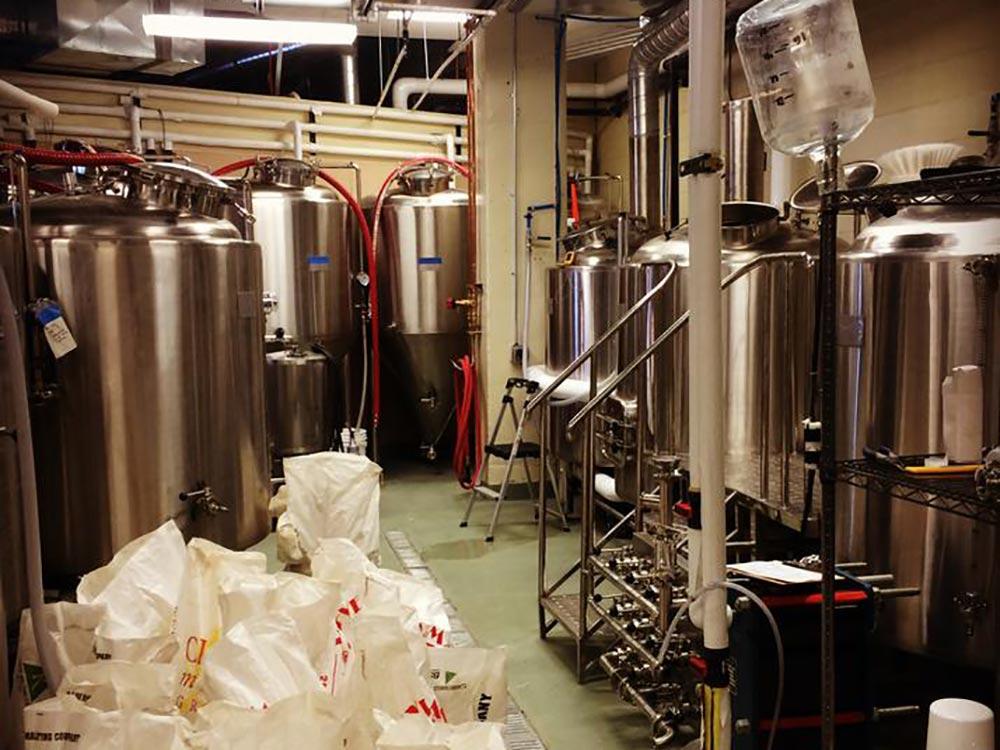20,000KL Annual Production Brewery
- Sep 28, 2026
- 124
- tiantai
1.) Brief introduction
The 20,000-ton annual capacity brewing equipment is designed for mid-sized breweries seeking efficiency and flexibility. It supports a variety of beer styles, from lagers to craft ales, with batch sizes between 10–20 hectoliters. Featuring stainless steel construction, automated PLC controls, and an advanced CIP system, it ensures high-quality brewing and sanitation standards. Energy-efficient and customizable, it’s perfect for regional distribution or contract brewing operations, balancing large-scale production with consistent beer quality.

2.) Design Basis of 20,000KL Annual Production Brewery
3.) Key Equipment of 10,000KL Annual Production Brewery


4.) Brewing technology of 20,000KL Annual Production Brewery
Ingredients Crushing and Feeding: Equipped with bucket elevator,Scraper conveyer, grist silo and mill etc, with precise malt dosing controlled by load cells.Each batch takes about 20 minutes for crushing.
Mashing: Utilizing an immersion mashing process with over 10 pre-stored recipes. The mashing process is fully automated.
Lautering: The spent grain bed is designed to be 30-40 cm thick, and spent grain is conveyed via gas pulse system. A storage tank supports two days' worth of production.
Boiling: Atmospheric boiling with internal heaters to enhance boiling strength. Evaporation intensity is 8%. It includes an automatic 200L hop dosing tank, with heat recovery from the chimney using a tube heat exchanger.
Whirlpool: Whirlpool inlet at 1/3 of the tank height, with a sloped bottom to reduce beer loss. Hot break is flushed from the center of the bottom.
Cooling: One-stage cooling with 2°C chilled water, reducing energy and water consumption. The process generates 80°C hot water, which is recovered and stored in a hot water tank.
Oxygenation: Sterile oxygenation with compressed air and terminal filters (0.01um), achieving oxygen levels of 8mg/L.
Yeast Addition: Liquid yeast from yeast propagation is added to the wort post-cooling as it flows through the wort line into the fermentation tank.
Fermentation: Single-tank fermentation process with a 20-day fermentation cycle. Hygienic pipe plates ensure there are no dead corners for cleaning. Two tanks are grouped with closed pipelines, preventing contamination.
Yeast Recovery: Yeast is manually recovered into 600L and 1500L recovery tanks.
Yeast Propagation: Using a three-stage yeast propagation technique.
Dry Hopping: Special equipment for dry hopping is provided, considering the large hop additions required for 13-15P IPA.
Filling: Beer from the fermentation vessels (FV) is transferred to bright beer tanks (BBT) for constant pressure filling. Beer kegs can be filled directly from the FV.
Dissolved Oxygen: Less than 40PPB, with air content below 1ml.
Production Time: Each batch takes approximately 7 hours to produce.
Spent Grain Handling: Spent grain is conveyed using a gas pulse system, with storage tanks that can support all-day production. The mashing system's capacity allows for 8 batches per day. The system is equipped with Siemens S7-1500 CPU modules, enabling full automation in the brewing process. Sensors and low-voltage electrical components are from leading international brands.
Production Safety: Safety features include proximity switches on manholes, boiling foam electrodes to prevent overflow, stainless steel piping, automatic CIP dosing system, hygienic pipe plates, and contamination prevention.
Energy Efficiency: Steam line condensate recovery, boiling heat recovery, hot water recovery after heat exchangers, CO2 recovery, electricity savings through nighttime cooling, yeast recovery and sales, and spent grain recovery and sales.
5) Automation Level of 30,000KL Industrial Brewery
To realize maximum automation level
Valves automation: pneumatic butterfly, pneumatic angle seat valve, pneumatic ratio angle seat valve
One click brewing to save manual operation and reducing error rates
Auto water mixing station for mashing or sparging
Auto wort cooling station to reach needed fermentation temperature
Auto brewing process, includes mashing, lautering, boiling and whirlpool
Auto discharge of spent grain
Auto mashing in before official brew day to save time and help streamline your mashing process
Auto vessel pre-heating to save time and improve brewing consistency.
Auto vessel flushing to maintain high level cleanliness and efficiency in brewing
Recipe storage for different types beer
Auto alarm protection
Auto security protection
Auto log archiving

6.) Features of 20,000KL Annual Production Brewery
1. Mid-Scale Production: Ideal for regional distribution, this system is designed to produce up to 20,000 tons of beer annually, balancing large-scale output with operational flexibility.
Versatile Brewing: Supports a wide range of beer styles, including lagers, ales, stouts, and craft brews, allowing breweries to diversify their product lineup.
2. Efficient Batch Sizes: Capable of brewing batches between 10-20 hectoliters, optimizing both small and large production runs.
3. Automated Control: PLC-based control systems ensure precise brewing, fermentation, and cleaning, resulting in consistent beer quality.
4. Energy Efficiency: Designed with energy-saving features to reduce operational costs and environmental impact.
5. CIP System: Equipped with an advanced Cleaning-in-Place system, ensuring high hygiene and safety standards.
6. Scalability: Flexible design allows for easy future expansion as production needs grow.

The 20,000-ton annual capacity brewing equipment is designed for mid-sized breweries seeking efficiency and flexibility. It supports a variety of beer styles, from lagers to craft ales, with batch sizes between 10–20 hectoliters. Featuring stainless steel construction, automated PLC controls, and an advanced CIP system, it ensures high-quality brewing and sanitation standards. Energy-efficient and customizable, it’s perfect for regional distribution or contract brewing operations, balancing large-scale production with consistent beer quality.

2.) Design Basis of 20,000KL Annual Production Brewery
| Annual Production | 20,000KL |
| No. Of Working Days Per Year | 300 Days |
| No. Of Brews Per Day | 6-8 Brews |
| Beer Type | Ale, Lagers, IPA, Stouts |
| Fermentation Cycle | 15 Days |
| Ingredients | Barley Malt with rice and corn |
| Total Losses | 10% including 4% contraction losses |
| Packaging | 60% Bottles, 30% Cans and 10% Kegs |
| Minimum/Maximum Ambient Temperature | -10℃-45℃ |
| Electrical Power Supply | 3Phase, 220-415V, 50/60Hz |
3.) Key Equipment of 10,000KL Annual Production Brewery
| Malt Milling Unit | Bucket Elevator |
| Malt Storage Tank | |
| Scraper conveyer | |
| Dry Miller/Wet Miller | |
| Grist Silo | |
| Milling Controlling Cabinet | |
| Brewhouse Unit | 10KL Mash Tun |
| 5KL Cooker | |
| 10KL Lauter Tun | |
| 10KL Kettle Tun | |
| 10KL Buffer Tun | |
| 10KL Whirlpool Tun | |
| With Pump, Valves, Pipe, Heat Exchanger etc | |
| Cellar Unit | 10x 10KL Fermenter |
| 15x 20KL Fermenter | |
| 15x 40KL Fermenter | |
| Filtration Unit | Filtration Unit |
| Bright Beer Tank | 1x 20KL Bright Beer Tank |
| 1x 40KL Bright Beer Tank | |
| Packaging Unit | 4000bph Bottling Line |
| 2000cph Canning Line | |
| 30-40kph Kegging Line | |
| CIP Unit |
1000L Brewhouse CIP System, Caustic Tank + Hot Water Tank |
| 3000L Cellar CIP System, Hot Water Tank+Acid Tank +Caustic Tank+Sterilize Tank | |
| Control Unit | Full-Automatic PLC with Industrial Computer |
| Utility System |
Water Treatment System, Steam Generating System, Air Compressor, Glycol Chilling System etc |


4.) Brewing technology of 20,000KL Annual Production Brewery
Ingredients Crushing and Feeding: Equipped with bucket elevator,Scraper conveyer, grist silo and mill etc, with precise malt dosing controlled by load cells.Each batch takes about 20 minutes for crushing.
Mashing: Utilizing an immersion mashing process with over 10 pre-stored recipes. The mashing process is fully automated.
Lautering: The spent grain bed is designed to be 30-40 cm thick, and spent grain is conveyed via gas pulse system. A storage tank supports two days' worth of production.
Boiling: Atmospheric boiling with internal heaters to enhance boiling strength. Evaporation intensity is 8%. It includes an automatic 200L hop dosing tank, with heat recovery from the chimney using a tube heat exchanger.
Whirlpool: Whirlpool inlet at 1/3 of the tank height, with a sloped bottom to reduce beer loss. Hot break is flushed from the center of the bottom.
Cooling: One-stage cooling with 2°C chilled water, reducing energy and water consumption. The process generates 80°C hot water, which is recovered and stored in a hot water tank.
Oxygenation: Sterile oxygenation with compressed air and terminal filters (0.01um), achieving oxygen levels of 8mg/L.
Yeast Addition: Liquid yeast from yeast propagation is added to the wort post-cooling as it flows through the wort line into the fermentation tank.
Fermentation: Single-tank fermentation process with a 20-day fermentation cycle. Hygienic pipe plates ensure there are no dead corners for cleaning. Two tanks are grouped with closed pipelines, preventing contamination.
Yeast Recovery: Yeast is manually recovered into 600L and 1500L recovery tanks.
Yeast Propagation: Using a three-stage yeast propagation technique.
Dry Hopping: Special equipment for dry hopping is provided, considering the large hop additions required for 13-15P IPA.
Filling: Beer from the fermentation vessels (FV) is transferred to bright beer tanks (BBT) for constant pressure filling. Beer kegs can be filled directly from the FV.
Dissolved Oxygen: Less than 40PPB, with air content below 1ml.
Production Time: Each batch takes approximately 7 hours to produce.
Spent Grain Handling: Spent grain is conveyed using a gas pulse system, with storage tanks that can support all-day production. The mashing system's capacity allows for 8 batches per day. The system is equipped with Siemens S7-1500 CPU modules, enabling full automation in the brewing process. Sensors and low-voltage electrical components are from leading international brands.
Production Safety: Safety features include proximity switches on manholes, boiling foam electrodes to prevent overflow, stainless steel piping, automatic CIP dosing system, hygienic pipe plates, and contamination prevention.
Energy Efficiency: Steam line condensate recovery, boiling heat recovery, hot water recovery after heat exchangers, CO2 recovery, electricity savings through nighttime cooling, yeast recovery and sales, and spent grain recovery and sales.
5) Automation Level of 30,000KL Industrial Brewery
To realize maximum automation level
Valves automation: pneumatic butterfly, pneumatic angle seat valve, pneumatic ratio angle seat valve
One click brewing to save manual operation and reducing error rates
Auto water mixing station for mashing or sparging
Auto wort cooling station to reach needed fermentation temperature
Auto brewing process, includes mashing, lautering, boiling and whirlpool
Auto discharge of spent grain
Auto mashing in before official brew day to save time and help streamline your mashing process
Auto vessel pre-heating to save time and improve brewing consistency.
Auto vessel flushing to maintain high level cleanliness and efficiency in brewing
Recipe storage for different types beer
Auto alarm protection
Auto security protection
Auto log archiving

6.) Features of 20,000KL Annual Production Brewery
1. Mid-Scale Production: Ideal for regional distribution, this system is designed to produce up to 20,000 tons of beer annually, balancing large-scale output with operational flexibility.
Versatile Brewing: Supports a wide range of beer styles, including lagers, ales, stouts, and craft brews, allowing breweries to diversify their product lineup.
2. Efficient Batch Sizes: Capable of brewing batches between 10-20 hectoliters, optimizing both small and large production runs.
3. Automated Control: PLC-based control systems ensure precise brewing, fermentation, and cleaning, resulting in consistent beer quality.
4. Energy Efficiency: Designed with energy-saving features to reduce operational costs and environmental impact.
5. CIP System: Equipped with an advanced Cleaning-in-Place system, ensuring high hygiene and safety standards.
6. Scalability: Flexible design allows for easy future expansion as production needs grow.


zhutu.jpg)


